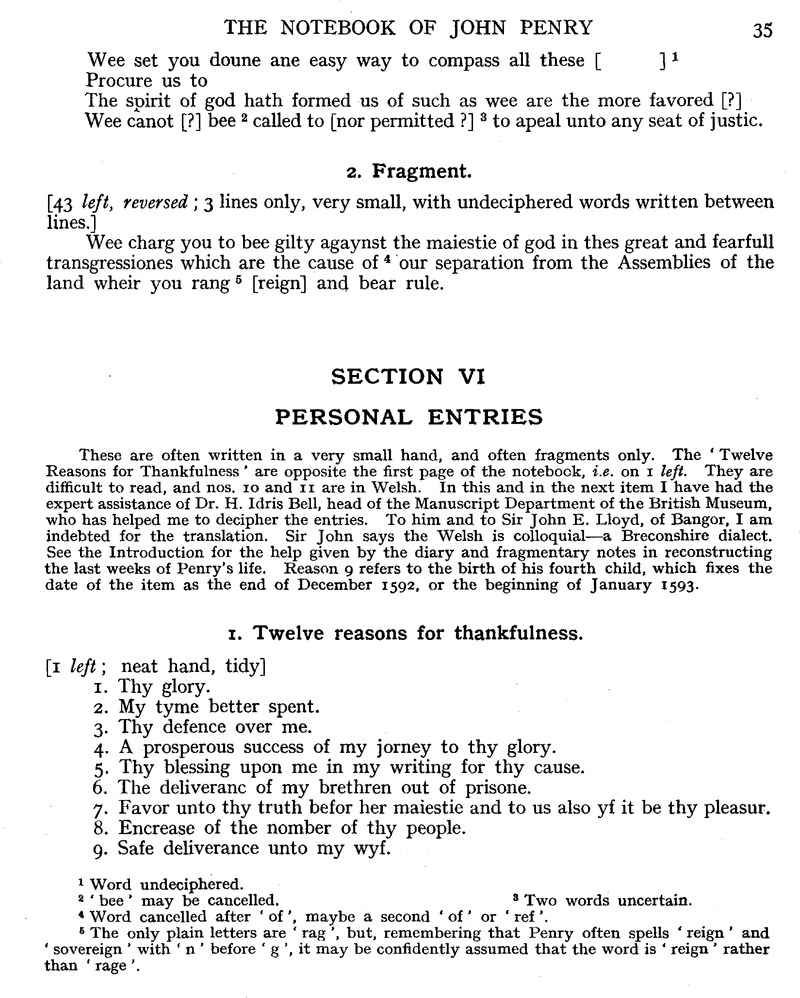Article contents
Section VI: Personal Entries
Published online by Cambridge University Press: 24 December 2009
Abstract

- Type
- The Notebook of John Penry, 1593
- Information
- Copyright
- Copyright © Royal Historical Society 1944
References
page 36 note 2 By cancellations and writing over this becomes ‘the god that made these heavens’.
page 36 note 3 For ‘mak’.
page 36 note 4 Sentence breaks off.
page 36 note 5 Possibly ‘be at’ or ‘mak’.
page 36 note 6 Word undeciphered ; looks like ‘noqeo’, as if Penry had made a noun from noceo = harms, hurts, injuries, sins.
1 Nicholas Lee had been elected one of the deacons of the church, which often met in his house in Cow Lane, Smithfield, to which Penry and his wife went on 3 March. He had been a member of the congregation for some time, and his name appears among a list of those in prison in 1590. In 1593, however, he seems to have escaped examination and arrest, and Burrage (E.E.D., i, 184) argues that subsequently he became pastor of the remnant of the church left in London, and was alive nearly thirty years later. His wife was also a member of the church, and the name of Thomas Lee also appears. Nicholas Lee had young children, who were baptized at the meetings.
2 Across middle of page, marginal cross in ink, and no doubt used in the trial.
3 Scipio Bellot (the name is variously spelt) was convicted on 23 March 1593, with Robert Bowle and Daniel Studley, for publishing and dispersing the seditious books Barrow and Greenwood had devised, and for which they were convicted; all five were sentenced to death the next day. Attorney-General Egerton reported to the lord keeper that all of them protested their loyalty to the queen, and denied the books were seditious, being not against the government of the land, but against the bishops. ‘None showed any tokens of Recognicon of theyr offence and prayer of mercy for the same, sauing Bellott alone, who desyreth conference and to be informed of his errours and with teares affyrmeth hym selfe to be sorye that he hath bene mysled.’ Be that as it may, he and Bowle ‘died a while after in prison in Newgate’ (An Apologie or defence of such true Christians as are commonly (but unjustly) called Brownists, 1604, p. 95), and his name appears in the Brownists' True confession of faith (1596) among ‘24 soules [that] have perished in their prisons within the Cittie of London only’. He is probably the Stephen Byllet to whom Barrow, in his examination on 20 March 1593, said he gave two letters in his handwriting to be copied. He is called ‘gentleman’, and is perhaps the brother of Arthur Bellot, ‘a Scholler and a Souldier’, who had been partly instrumental in getting some of Barrow and Greenwood's books printed at Dort. Arthur was taken with Penry on 22 March, and when examined in April said he was 25 years old, and came from Llanteglos in Cornwall. Foster describes him thus : ‘of Cornwall, gent. Exeter Coll., matric. 30 July, 1585, aged 18.’ Scipio does not appear in Foster, who has many later Cornish ‘Bellotts’.
4 Word scored out, probably the first three letters of ‘delivered’.
5 Blot obscures word, which looks like another ‘befor’.
page 38 note 1 See Introduction and the letter to Christopher Goodman, below, pp. 41–44.
page 38 note 2 Jenkin Jones was a kinsman of Penry's ; he was mixed up in the Martin Marprelate business.
page 38 note 3 I.e., inclining to accept Penry's views ?
page 38 note 4 Arglwûdes, Welsh = ‘Lady’. At, if Welsh = ‘To’. So may be ‘To Lady West’. Attempts to discover any ‘Lady West’ have so far failed, nor are the other names under this entry identifiable.
page 38 note 5 Possibly ‘thes’ ; after this word is an erasure, looks like ‘tw’.
page 39 note 1 Probably William Smith, minister of Bradford in Wiltshire, a man of about Penry's age, who, when examined on 5 April, 1593, said he had come to London to confer with Johnson, Greenwood, and others, and had been in prison for about eight weeks on suspicion of being concerned in the coffin episode. On April 3 John Dalamore of Bath said he had heard Smith and others preach at Keynsham and other places in Somersetshire.
page 39 note 2 Deliverance was Penry's eldest child.
page 39 note 3 3 and 4 marked in margin by parallel lines in pencil, and a cross in ink.
page 39 note 4 Word undeciphered : ? ‘sorelie’, ‘sternlie’.
page 39 note 5 These four words all very small indeed ; only the ‘I’ is certain; the fourth is quite unreadable.
page 39 note 6 Ends in ‘d’ ; may be ‘wood’, but the first letter looks like ‘K’.
page 39 note 7 Short name, ending ‘th’ ; should be identifiable, but has proved elusive.
page 40 note 1 In the Dedicatory Epistle to A Plaine Refutation of M. Giffards Booke (1591) addressed to Cecil, Barrow and Greenwood used the word, saying : ‘But in stead of this Christian course, they have shut us up now more then three yeares in miserable and close prisons from the aire, from all exercise, from all company or conuersation with any person, from all meanes so much as to write, yncke and paper beeing taken and kept from us, and a diligent watch both by our keepers held over us, and also continuall searches upon one pretence or other made, where wee were rifled from tyme to tyme of all our papers and writinges they could finde.’
- 1
- Cited by


